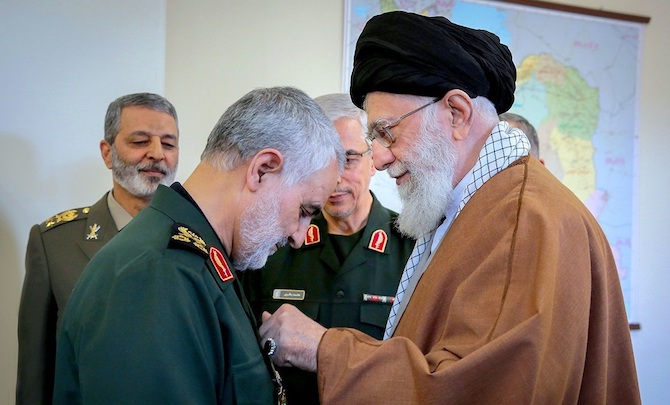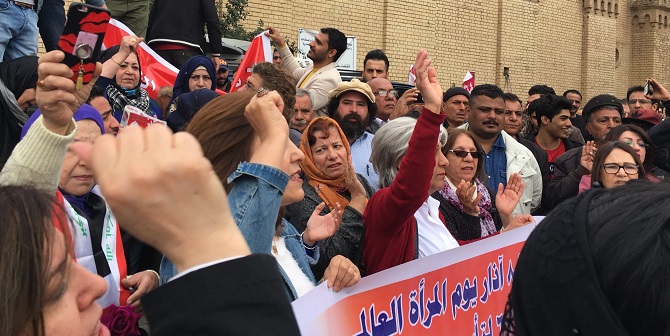This blog was originally published on the LSE Middle East Centre blog on 8 January 2020.

Iran excels at nurturing paramilitary forces across the Middle East. When it comes to cultivating persuasive ‘soft power’ amongst publics more broadly in the region, however, it has a chequered record. Iran has historically enjoyed a measure of Arab public sympathy for its nuclear programme. Iranian resistance to US and Israeli agendas has furthermore earned the regime a degree of popular acclaim: regional approval ratings of the leadership rose markedly after Hezbollah took on Israel in the 2006 Lebanon War. In the predominantly Sunni Arab world, however, public opinion of the regime has plummeted since then, particularly in light of its activities during the Arab Uprisings. Iran’s sponsorship of mainly Shi’a militant groups stirred broad distrust of its geopolitical intentions and lent credibility to the theory that it seeks to create a ‘Shi’a crescent’ of influence across the Middle East. Its outreach programmes are often dismissed as bids to convert Iranian clients to the Khomeinist doctrine of ‘wilayat al-faqih’ (Guardianship of the Jurisprudent).
Even in Iraq, where 65 percent of the population identify as Shi’a, there had been growing resentment of pervasive Iranian influence over religious, political, security and cultural affairs. This influence has been extensive since regime change in 2003, but in mid-2014, ISIL’s military campaign across Iraq seemingly gave a carte blanche to Iran’s Quds Force to offer weaponry, technical support and advice to the Shi’a militias which it has backed since the US occupation, and to foster the growth of new ones formed to combat ISIL. Qassem Soleimani operated in Iraq on the invitation of the Iraqi government (or at least part of it) and continued to do so in the aftermath of ISIL’s defeat in 2017.
Iranian influence in Iraq has deepened since then. The success of Fatah, a political alliance of Iranian-backed militia leaders including those of the Badr Organisation, Kata’ib Hezbollah, Asa’aib Ahl Al-Haq and the Imam Ali Brigades, in the May 2018 parliamentary elections has reinforced Iranian leverage over the government. Meanwhile, on the ground, those same militias have taken control over large areas of western and northern Iraq, where they have been able to generate income from the local populace through a combination of deals with local businesses, checkpoint tolls, exploitation of natural resources and protection rackets.
To be sure, the Islamic Republic has always been better at ‘smart power’ (combining coercive and economic power with persuasive cultural influence) than at either hard or soft power alone. Since its formation, the regime has faced almost constant international sanctions, limiting its conventional military capabilities and encouraging reliance on more economical forms of guerrilla warfare. Ideologically, while the regime sought from the outset to appeal to the Muslim umma in the region overall, uptake of its initiatives has been increasingly confined to Shi’a communities. But Iran has made the most of its limitations in Iraq, deriving smart power by manipulating the combination of identity politics, patronage networks, and coercion which have become prevalent in Iraqi politics and society, and permeating grassroots religious and charitable institutions and the informal economy in ways that Western allies have neither the ability nor the inclination to do.
Periodic polling by Al-Mustakella for Research between 2005 and 2019 suggests that amongst Iraq’s Shi’a, shifting views on whether Iran is a reliable partner have roughly corresponded to the threat level posed by Sunni militant jihadists at any given time (and potentially also the presence or absence of US and allied forces). The 61% Shi’a approval rating for Iran in 2005–6 during the first phase of sectarian conflict fell to 26% after the US-led surge and military drawdown in 2009–10. During the war against ISIL in 2014–15, approval for Iran hit 86%, but fell after ISIL’s defeat to 49% in 2018–early 2019 (and just 36% when Sunnis were included). Iran is clearly aware of this dynamic: its media outlets have continually justified the country’s paramilitary role in Iraq by emphasising the ongoing threat of Sunni militant extremists and of ‘Zionist-Crusader’ (principally American) forces in the country, long after victory over ISIL was declared.
Amongst the generation of Iraqi Shi’a who grew up after the fall of Saddam, however, there are many who reject this level of interference. Polling in late 2019 amongst the predominantly young and Shi’a pro-reform protesters in Baghdad and the southern provinces indicated that only 1 percent trusted Iran (compared with 7 percent who trusted the US, and 30 percent who trusted the UN). Over the past few months, criticism of Iran’s role in promulgating entrenched corruption in Iraq has become increasingly outspoken, and while Iranian-backed elements of the security forces were reportedly responsible for repressive crackdowns on protestors, in terms of public relations, Iran was on the back foot. Iranian-sponsored Arab media were careful not to speak out against Iraq’s senior religious authority, Sayyid al-Sistani, who defended the ‘legitimate demands’ of peaceful protestors. Rather, a common reading of the protests by those outlets was to stress that agents provocateurs had sabotaged the legitimate protests, leading to bloody outcomes.
The assassination of Qassem Soleimani (along with Abu Mahdi al-Muhandis, the de facto head of Iraq’s Popular Mobilisation Forces in the Iraqi government) in a US drone strike on Baghdad airport last Friday could well signal a death knell for the protest movement. In Tahrir Square, protestors reportedly staged some small-scale celebrations after news of Soleimani’s death on Friday, but eyewitness accounts have subsequently suggested that overall, the news had a sobering effect on the protest atmosphere, as anticipation of a crackdown swells. Expressing anti-Iranian sentiment threatens to be quickly transformed from a legitimate right to an act of national treachery.
Note: The CRP blogs gives the views of the author, not the position of the Conflict Research Programme, the London School of Economics and Political Science, or the UK Government.






If some consider themselves followers of the martyr Suleimani and consider their heart to be the martyrs’ aspirations, it is better to refrain from flattering him, and to make the unity of the martyrs with the intolerable and unmistakable statements, divide the spirit of martyrs into intentions. Do not be offended by their politics. According to martyr Beheshti, the plague of this revolution is where some make everything for themselves.